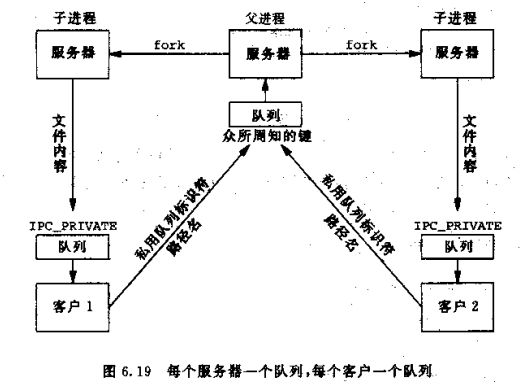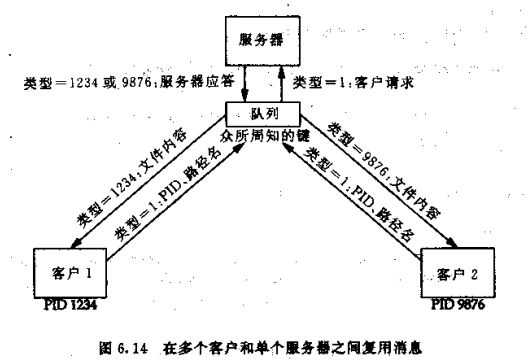XSI IPC——System V消息队列
System V消息队列
1、key_t键和ftok函数
三种类型的System V IPC使用key_t值作为它们的名字,头文件<sys/types.h>把key_t这个数据类型定义为一个整数。
函数ftok把一个已存在的路径名和一个整数标识符转换成一个key_t值,称为IPC键。
#include <sys/ipc.h>
key_t ftok(const char* pathname, int id);
该函数把从pathname导出的信息与id的低序8位组合成一个整数IPC键。
2、ipc_perm结构
内核给每一个IPC对象维护一个信息结构,ipc_perm:
struct ipc_perm{
uid_t uid; /* owner's user id*/
gid_t gid; /* owner's group id*/
uid_t cuid;/* creator's user id*/
gid_t cgid;/* creator's group id*/
mode_t mode;
ulong_t seq;
key_t key;
};
3、msgget函数
消息队列是消息的链接表,存放在内核中并由消息队列标识符标识。
msgget用于创建一个新队列或打开一个现存的队列,msgsnd将新消息添加到队列尾端,每个消息包含一个正长整型类型字段,一个非负
长度以及实际数据字节,所有这些都在将消息添加到队列时传送给msgsnd,msgrcv用于从队列中去消息。但并不一定以先进先出次序
取消息,也可以按照消息的类型字段去消息。消息结构msqid_ds:
struct msqid_ds{
struct ipc_perm msg_perm;
msgqnum_t msg_qnum;
msglen_t msg_qbytes;
pid_t msg_lspid;
pid_t msg_lrpid;
time_t msg_stime;
time_t msg_ctime;
time_t msg_rtime
};
打开一个现存队列或创建一个新队列:msgget
#include<sys/msg.h>
int msgget(key_t key,int flag);
返回值是一个整数标识符,其他三个msg函数就用它来指代该队列。它是基于指定的key产生,而key既可以是ftok的返回值,也可以是
常量IPC_PRIVATE。
msg_perm结构中的uid,cuid成员被设置为当前进程的有效用户ID,gid和cgid成员被设置为当前进程的有效组ID
flag中的读写权限存放在msg_perm.mode中
msg_qnum,msg_lspid,msg_lrpid,msg_stime,msg_rtime设为0
msg_ctime设置为当前时间
msg_qbytes设置成系统限制值。
4、msgsnd函数
使用msgget打开一个消息队列后,使用msgsnd往其上放置一个消息。
#include <sys/msg.h>
int msgsnd(int msqid,const void* ptr, size_t length,int flag);
其中msqid是由msgget返回的标识符。ptr是一个结构指针,该结构具有如下的模板,它定义在<sys/msg.h>中。
struct msgbuf{
long mtype; //message type, must be > 0
char mtext[1];//message data,任何形式的数据都允许,不限于文本
};
flag参数可以为0,也可以是IPC_NOWAIT,IPC_NOWAIT标志使得msgsnd调用非阻塞。
5、msgrcv函数
使用msgrcv函数从某个消息队列中读取一个消息。
#include <sys/msg.h>
ssize_t msgrcv(int msqid, void* ptr,size_t length, long type, int flag)
其中ptr参数指定所接收消息的存放位置;
length指定由ptr指向的缓冲区中数据部分的大小;
type指定希望从所给定的队列中读取什么样的信息;type=0,那就返回该队列中的第一个消息;type>0,那就返回其类型值为type的第一个消息;
如果type<0,那就返回其类型值小于或等于type参数的绝对值的消息中类型值最小的第一个消息。
6、msgctl函数
msgctl函数提供在一个消息队列上的各种控制操作。
#include <sys/msg.h>
int msgctl(int msqid,int cmd,struct msqid_ds *buf);
msgctl函数提供三个命令:IPC_RMID,从系统中删除msqid指定的消息队列;IPC_SET,给所指定的消息队列设置其msqid_ds结构的以下四个成员
msg_perm.uid,msg_perm.gid,msg_perm.mode和msg_qbytes。它们的值由buf参数指向的结构中的相应成员;IPC_STAT,通过buf参数

1、key_t键和ftok函数
三种类型的System V IPC使用key_t值作为它们的名字,头文件<sys/types.h>把key_t这个数据类型定义为一个整数。
函数ftok把一个已存在的路径名和一个整数标识符转换成一个key_t值,称为IPC键。
#include <sys/ipc.h>
key_t ftok(const char* pathname, int id);
该函数把从pathname导出的信息与id的低序8位组合成一个整数IPC键。
2、ipc_perm结构
内核给每一个IPC对象维护一个信息结构,ipc_perm:
struct ipc_perm{
uid_t uid; /* owner's user id*/
gid_t gid; /* owner's group id*/
uid_t cuid;/* creator's user id*/
gid_t cgid;/* creator's group id*/
mode_t mode;
ulong_t seq;
key_t key;
};
3、msgget函数
消息队列是消息的链接表,存放在内核中并由消息队列标识符标识。
msgget用于创建一个新队列或打开一个现存的队列,msgsnd将新消息添加到队列尾端,每个消息包含一个正长整型类型字段,一个非负
长度以及实际数据字节,所有这些都在将消息添加到队列时传送给msgsnd,msgrcv用于从队列中去消息。但并不一定以先进先出次序
取消息,也可以按照消息的类型字段去消息。消息结构msqid_ds:
struct msqid_ds{
struct ipc_perm msg_perm;
msgqnum_t msg_qnum;
msglen_t msg_qbytes;
pid_t msg_lspid;
pid_t msg_lrpid;
time_t msg_stime;
time_t msg_ctime;
time_t msg_rtime
};
打开一个现存队列或创建一个新队列:msgget
#include<sys/msg.h>
int msgget(key_t key,int flag);
返回值是一个整数标识符,其他三个msg函数就用它来指代该队列。它是基于指定的key产生,而key既可以是ftok的返回值,也可以是
常量IPC_PRIVATE。
flag是读写权限值的组合,还可以与IPC_CREAT或IPC_CREAT|IPC_EXCL按位或。
IPC_EXCL如果该队列已经存在,再加上该字段会报错,具体EXCL的意思类似于文件IO中的open函数中O_EXCL参数的含义。
msg_perm结构中的uid,cuid成员被设置为当前进程的有效用户ID,gid和cgid成员被设置为当前进程的有效组ID
flag中的读写权限存放在msg_perm.mode中
msg_qnum,msg_lspid,msg_lrpid,msg_stime,msg_rtime设为0
msg_ctime设置为当前时间
msg_qbytes设置成系统限制值。
4、msgsnd函数
使用msgget打开一个消息队列后,使用msgsnd往其上放置一个消息。
#include <sys/msg.h>
int msgsnd(int msqid,const void* ptr, size_t length,int flag);
其中msqid是由msgget返回的标识符。ptr是一个结构指针,该结构具有如下的模板,它定义在<sys/msg.h>中。
struct msgbuf{
long mtype; //message type, must be > 0
char mtext[1];//message data,任何形式的数据都允许,不限于文本
};
flag参数可以为0,也可以是IPC_NOWAIT,IPC_NOWAIT标志使得msgsnd调用非阻塞。
5、msgrcv函数
使用msgrcv函数从某个消息队列中读取一个消息。
#include <sys/msg.h>
ssize_t msgrcv(int msqid, void* ptr,size_t length, long type, int flag)
其中ptr参数指定所接收消息的存放位置;
length指定由ptr指向的缓冲区中数据部分的大小;
type指定希望从所给定的队列中读取什么样的信息;type=0,那就返回该队列中的第一个消息;type>0,那就返回其类型值为type的第一个消息;
如果type<0,那就返回其类型值小于或等于type参数的绝对值的消息中类型值最小的第一个消息。
6、msgctl函数
msgctl函数提供在一个消息队列上的各种控制操作。
#include <sys/msg.h>
int msgctl(int msqid,int cmd,struct msqid_ds *buf);
msgctl函数提供三个命令:IPC_RMID,从系统中删除msqid指定的消息队列;IPC_SET,给所指定的消息队列设置其msqid_ds结构的以下四个成员
msg_perm.uid,msg_perm.gid,msg_perm.mode和msg_qbytes。它们的值由buf参数指向的结构中的相应成员;IPC_STAT,通过buf参数
给调用者返回对应所指定消息队列的当前msqid_ds结构。
写个客户-服务器例子,创建两个消息队列,一个队列用来从客户到服务器的消息,一个队列用于从服务器到客户的消息。主要功能是:客户向服务器发现一条消息,服务接收到并输出接收到的客户消息,然后服务器向客户发送一条消息,客户显示服务器发送的消息。
下面代码在测试中使用注释部分的代码会出问题,具体见代码中的注释。
头文件:
#ifndef SYSVMSG_H
#define SYSVMSG_H
#include <stdio.h>
#include <stdlib.h>
#include <string.h>
#include <errno.h>
#include <error.h>
#include <unistd.h>
#include <fcntl.h>
#include <sys/msg.h>
#include <sys/ipc.h>
#include <sys/types.h>
#define MSGQ_ID1 27
#define MSGQ_ID2 54
#define SENDMSG_TYPE 1
#define RECVMSG_TYPE 2
#define PATHNAME1 "/tmp/msg1"
#define PATHNAME2 "/tmp/msg2"
#define N 256
#define MSG_R 0400
#define MSG_W 0200
#define MODE IPC_CREAT | MSG_R | MSG_W | MSG_R>>3 | MSG_R>>6
struct Data{
int a;
int b;
//char *buf;//这里也不要用指针
char buf[N];
};
struct msgbuf{
long mtype;
struct Data mdata;//这里不要用指针
};
#endif
Server.c
#include "sysvmsg.h"
void server(int readfd,int writefd){
struct msgbuf *recv,*send;
recv = (struct msgbuf*)malloc(sizeof(struct msgbuf));
send = (struct msgbuf*)malloc(sizeof(struct msgbuf));
ssize_t n;
puts("Waiting for client...");
if((n = msgrcv(readfd,recv,sizeof(struct msgbuf),RECVMSG_TYPE,0)) == -1){
perror("msgrcv error");
exit(-1);
}
printf("Received message from client: Content = %s, a = %d, b = %d\n",recv->mdata.buf,recv->mdata.a,recv->mdata.b);
//free(recv);/*这里如果不注释会出错,具体不知道,可能原因是在Client.c中free了,测试环境是centos6*/
puts("===========================================");
printf("Enter message content: ");
scanf("%s",send->mdata.buf);
printf("Enter two number: ");
scanf("%d%d",&send->mdata.a,&send->mdata.b);
send->mtype = SENDMSG_TYPE;
puts("Sending message to client...");
if(msgsnd(writefd,send,sizeof(struct msgbuf),0) == -1){
perror("msgsnd error");
exit(-1);
}
//free(send);//同上
}
int main(){
int readfd,writefd;
//PATHNAME1: Client send message to Server, Server receive message from Client
if((readfd = msgget(ftok(PATHNAME1,MSGQ_ID1),MODE)) == -1){
perror("msgget error");
exit(-1);
}
//PAHTNAME2: Server send message to Client, Client receive message from Server
if((writefd = msgget(ftok(PATHNAME2,MSGQ_ID2),MODE)) == -1){
perror("msgget error");
exit(-1);
}
server(readfd,writefd);
}
client.c
#include "sysvmsg.h"
void client(int readfd,int writefd){
struct msgbuf *recv,*send;
recv = (struct msgbuf*)malloc(sizeof(struct msgbuf));
send = (struct msgbuf*)malloc(sizeof(struct msgbuf));
ssize_t n;
printf("Enter message content: ");
scanf("%s",send->mdata.buf);
puts(send->mdata.buf);
printf("Enter two number: ");
scanf("%d %d",&send->mdata.a,&send->mdata.b);
printf("%d\n",&send->mdata.a);
send->mtype = RECVMSG_TYPE;
puts("Sending message to Server");
if(msgsnd(writefd,send,sizeof(struct msgbuf),0) == -1){
perror("msgsnd error");
exit(-1);
}
free(send);
puts("========================================");
if((n = msgrcv(readfd,recv,sizeof(struct msgbuf),SENDMSG_TYPE,0)) == -1){
perror("msgrcv error");
exit(-1);
}
printf("Received message from Server: Conten = %s, a = %d, b = %d\n",recv->mdata.buf,recv->mdata.a,recv->mdata.b);
free(recv);
}
int main(){
int readfd,writefd;
if((readfd = msgget(ftok(PATHNAME2,MSGQ_ID2),0)) == -1){
perror("msgget error");
exit(-1);
}
if((writefd = msgget(ftok(PATHNAME1,MSGQ_ID1),0)) == -1){
perror("msgget error");
exit(-1);
}
client(readfd,writefd);
msgctl(readfd,IPC_RMID,NULL);
msgctl(writefd,IPC_RMID,NULL);
return 0;
}
7、复用消息
消息队列中的消息结构可以由我们自由定义,具备较强的灵活性。通过消息结构可以共享一个队列,进行消息复用。
此种多个客户端和单个服务器使用同一个消息队列,死锁总是存在的,客户端可以填满消息队列后,妨碍服务器的发送应答,这些客户于是阻塞在msgsnd中,服务器同样如此。可检测这种死锁的方法之一是约定服务器对消息队列总是非阻塞写。
详细例子(客户端给服务器发送需要打开的文件名,服务器读取文件信息逐条发送给客户端):
公共头文件:
#include <stdio.h>
#include <stdlib.h>
#include <string.h>
#include <unistd.h>
#include <fcntl.h>
#include <sys/ipc.h>
#include <sys/msg.h>
#include <errno.h>
#include <sys/types.h>
#include <sys/signal.h>
#include <sys/wait.h>
#define MSG_R 0400
#define MSG_W 0200
#define MSG_X 0100
#define MSG_MODE MSG_R | MSG_R >> 3 | MSG_W | MSG_R >> 6 | IPC_CREAT
#define PATHNAME "/tmp/msg"
#define ID 3456
#define N 1024
struct msgbuf{
int mlen;//发送消息的长度
long mtype;
char mdata[N];
};
Server.c
#include "msghead.h"
const long client_type = 1;
void server(int readfd,int writefd){
struct msgbuf msg;
ssize_t n;
char* ptr;
long pid;
FILE *fp;
while(1){
if((n = msgrcv(readfd,&msg.mtype,sizeof(msg.mdata),client_type,0)) == 0){
puts("Pathname missing");
continue;
}
msg.mdata[n] = '\0';
printf("Received message from client: %s\n",msg.mdata);
if((ptr = strchr(msg.mdata,'#')) == NULL){
printf("bad request: %s\n",msg.mdata);
continue;
}
*ptr++ = 0;
pid = atoi(msg.mdata);
printf("pid = %d,filepath = %s,mdata = %s\n",pid,ptr,msg.mdata);
msg.mtype = pid;
if((fp = fopen(ptr,"r")) == NULL){
puts("Open file failed. Send msg to client");
int len = strlen(msg.mdata);
snprintf(msg.mdata+len,sizeof(msg.mdata)-len,": can't open %s\n",strerror(errno));
memmove(msg.mdata+len+1,ptr,strlen(ptr));
printf("mdata = %s",msg.mdata);
if(msgsnd(writefd,&msg.mtype,strlen(msg.mdata),0) == -1){
perror("msgsnd error");
exit(-1);
}
}else{
puts("Open file successfully.");
setvbuf(fp,msg.mdata,_IOLBF,sizeof(msg.mdata));
while(fgets(msg.mdata,sizeof(msg.mdata),fp) != NULL){
fflush(fp);
msgsnd(writefd,&msg.mtype,strlen(msg.mdata),0);
}
fclose(fp);
}
puts("send completed.");
if(msgsnd(writefd,&msg,0,0) == -1){
perror("msgsnd error");
exit(-1);
}
}
}
int main(){
int msqid;
if((msqid = msgget(ftok(PATHNAME,ID),MSG_MODE)) == -1){
perror("msgget error");
exit(-1);
}
server(msqid,msqid);
exit(0);
}
第二种方法就是使用并发服务器,多个客户端通过同一个消息队列给服务器发送消息,并且客户端新建自己的消息队列,服务器使用子进程来处理每个客户端的请求,并且使用客户端新建的消息队列将信息发送到客户端。通信模型如图:

公共头文件和上面的一样。
客户端给服务器发送需要打开的文件名,服务器读取文件信息逐条发送给客户端。
Server.c
#include "msghead.h"
void sig_child(int signo){
int stat;
pid_t pid;
while((pid = waitpid(-1,&stat,WNOHANG)) > 0);
printf("Catch signal %d\n",signo);
return;
}
void server(int readfd,int writefd){
FILE *fp;
ssize_t n;
char* ptr;
struct msgbuf msg;
signal(SIGCHLD,sig_child);
while(1){
msg.mtype = 1;
if((n = msgrcv(readfd,&msg.mtype,sizeof(msg.mdata),msg.mtype,0)) == 0){
puts("Pathname missing");
continue;
}
msg.mdata[n] = '\0';
printf("Received message from client = %s\n",msg.mdata);
if((ptr = strchr(msg.mdata,'#')) == NULL){
puts("bad request");
continue;
}
*ptr++ = 0;
writefd = atoi(msg.mdata);
msg.mtype = writefd;
printf("writefd = %d\n",writefd);
if(fork() == 0){
if((fp = fopen(ptr,"r")) == NULL){
printf("Open file failed, send message to client\n");
int len = strlen(msg.mdata);
snprintf(msg.mdata+len,sizeof(msg.mdata)-len,": can't open, %s\n",strerror(errno));
msg.mlen = strlen(msg.mdata);
//memmove(msg.mdata,ptr,msg.mlen);
printf("data = %s\n",msg.mdata);
if(msgsnd(writefd,&msg.mtype,msg.mlen,0) == -1){
perror("msgsnd error");
exit(-1);
}
}else{
printf("open file successfully.");
while(fgets(msg.mdata,sizeof(msg.mdata),fp) != NULL){
msg.mlen = strlen(msg.mdata);
if(msgsnd(writefd,&msg.mtype,msg.mlen,0) == -1){
perror("msgsnd error");
exit(-1);
}
}
fclose(fp);
}
puts("send completed");
msg.mlen = 0;
if(msgsnd(writefd,&msg.mtype,msg.mlen,0) == -1){
perror("msgsnd error");
exit(-1);
}
}
}
}
int main(){
int readfd,writefd;
if((readfd = msgget(ftok(PATHNAME,ID),MSG_MODE)) == -1){
perror("msgget error");
exit(-1);
}
server(readfd,writefd);
exit(0);
}
Client.c
#include "msghead.h"
void client(int readfd,int writefd){
struct msgbuf msg;
snprintf(msg.mdata,sizeof(msg.mdata),"%d",readfd);//将客户端消息队列的msqid发送给服务器
int len = strlen(msg.mdata);
msg.mdata[len] = '#';
fgets(&msg.mdata[len]+1,sizeof(msg.mdata)-len,stdin);//获取标准输入,直接append到msg.mdata
msg.mlen = strlen(msg.mdata);
if(msg.mdata[msg.mlen - 1] == '\n') msg.mlen --;
msg.mtype = 1;
printf("data = %s\n",msg.mdata);
if(msgsnd(writefd,&msg.mtype,msg.mlen,0) == -1){
perror("msgsnd error");
exit(-1);
}
ssize_t n;
msg.mtype = readfd;
while((n = msgrcv(readfd,&msg.mtype,sizeof(msg.mdata),msg.mtype,0)) > 0){
write(1,msg.mdata,n);
}
if(n == 0){
puts("Read file from server is completed");
}
}
int main(){
int readfd,writefd;
if((writefd = msgget(ftok(PATHNAME,ID),0)) == -1){//打开服务器创建的消息队列
perror("msgget error");
exit(-1);
}
if((readfd = msgget(IPC_PRIVATE,MSG_MODE)) == -1){//新建客户端自己独立的消息队列,使用IPC_PRIVATE
perror("msgget error");
exit(-1);
}
client(readfd,writefd);
msgctl(readfd,IPC_RMID,NULL);
exit(0);
}
